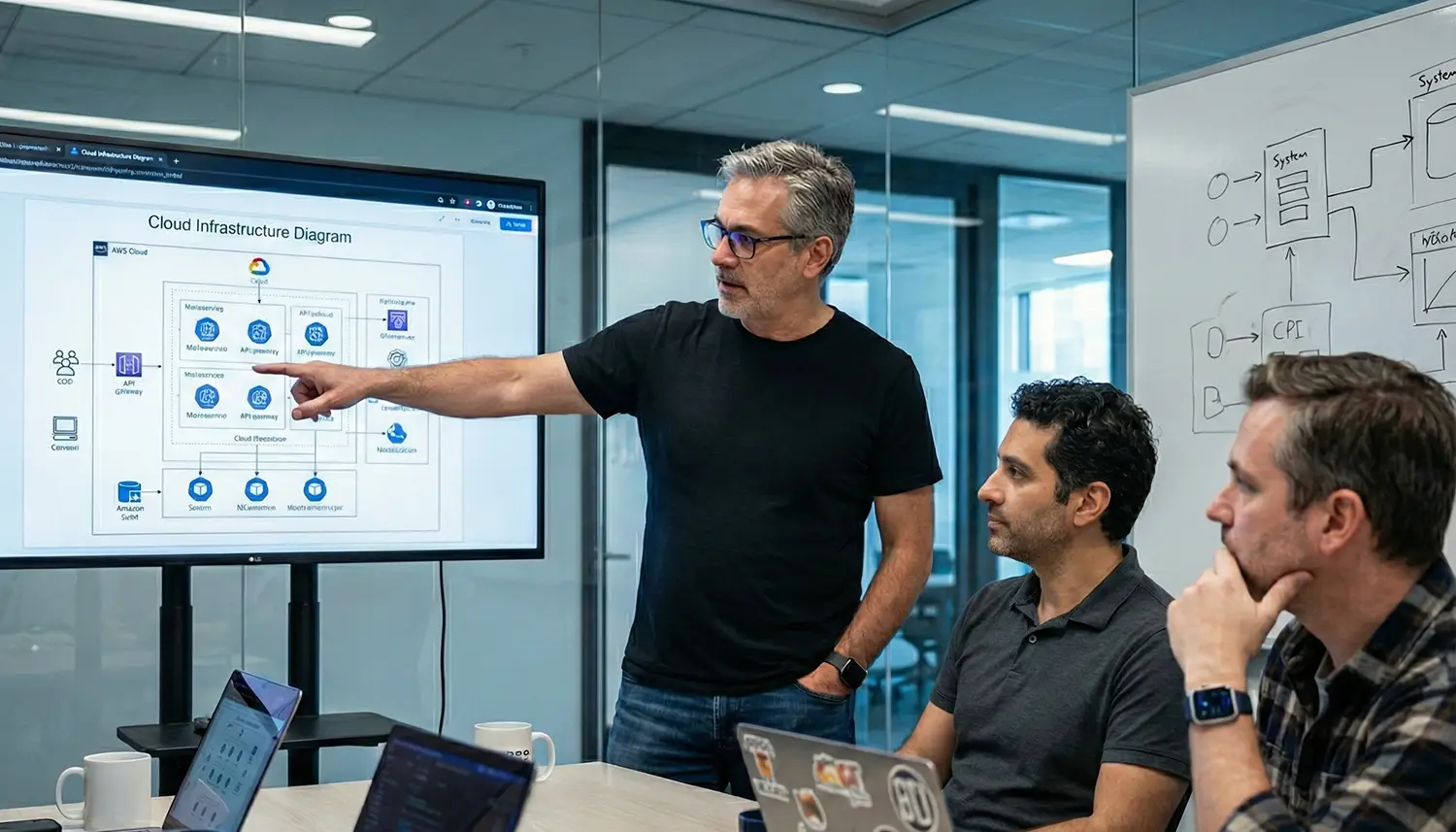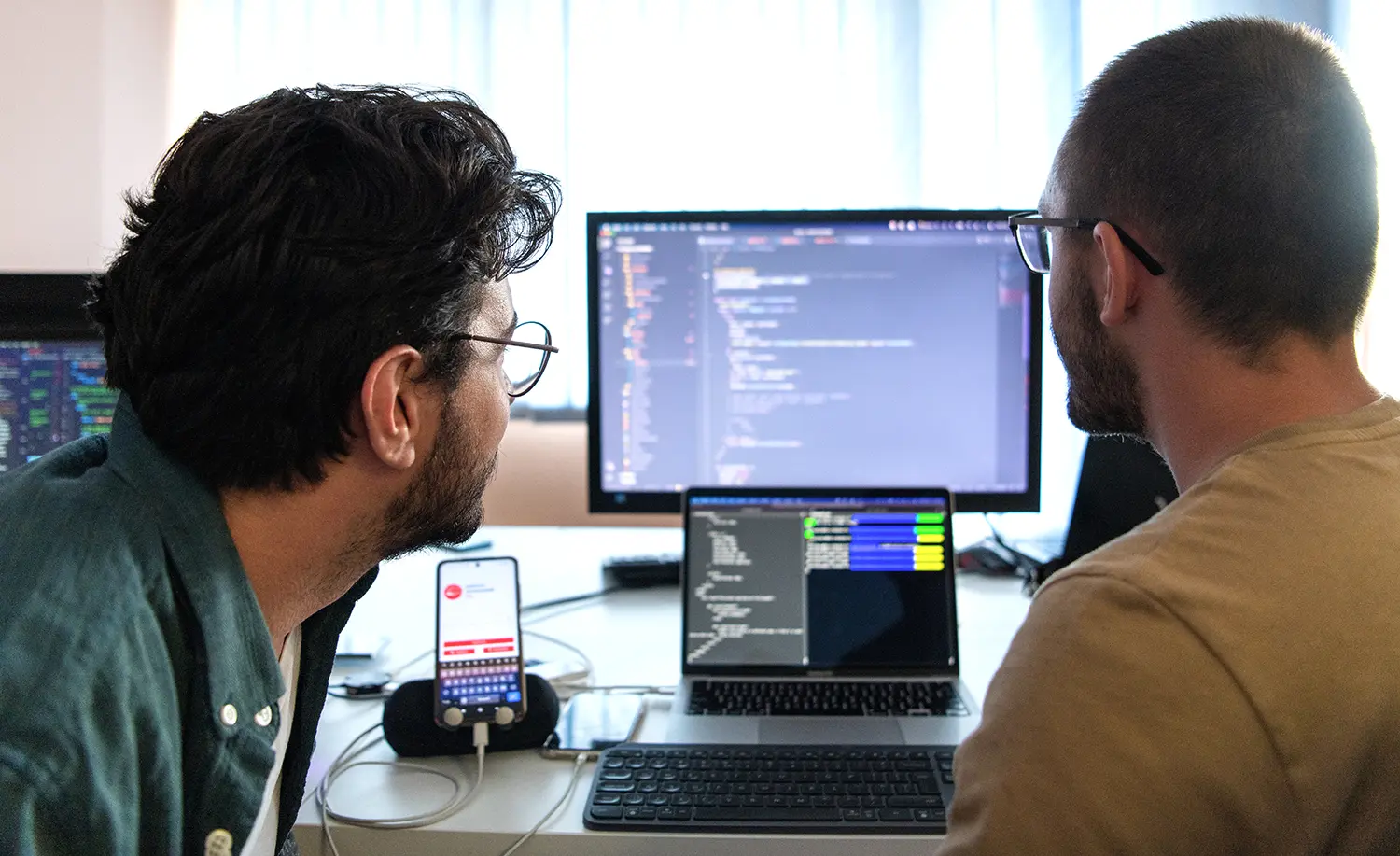By now, it’s clear that artificial intelligence (AI) has successfully revolutionized work processes across different industries, including education, medicine, engineering, finance, etc. Software development is not left behind, with AI transforming developers’ workflows and introducing new tools and technologies. But there’s more to come.
The AI market is changing and projected to grow at a CAGR of 36.6% in the next five years, with software development expected to experience a significant impact during this period.
While this growth signals increased work efficiency for developers, it also raises concerns for developers’ careers—positively & negatively. Considering the huge number of post-COVID layoffs experienced in the global market and tech industry, many developers wonder if AI will ease their workload or replace them entirely.
Truly, how will AI change software development, and what will do the next five years look like for developers and programmers?
Our verdict is clear: AI will augment the capabilities of human developers, enabling them to focus on higher-level tasks and innovation.
To better understand this, let’s journey through the evolution of software development and its impact on job creation/destruction, even before AI.
A Brief History of the Evolution of Software Engineering
It’s safe to say that software engineering has evolved continuously ever since its inception in the 1960s. Just like how humans evolved over millions of years, from ape-like ancestors to the modern humans we see today, according to scientific evidence. Software engineering has moved from engineers relying on their deep hardware expertise and error-prone coding processes to a simpler process that depends on high-level programming techniques.
Considering the evolution of the software development process, it’s obvious that every change focused on improving software efficiency and simplifying processes for increased productivity. By the 1990s, as the internet became a more important aspect of businesses and daily life, higher-end efficiency (such as faster processing power, internet connectivity, user-friendly interfaces, scalable solutions, etc.) was needed, leading to more transformation.
Below is a summary of the software engineering/development journey till its current growth stage:
- 1940s – The creation of the first programmable computers (e.g., ENIAC, 1945).
- 1950s – Introduction of assembly and high-level languages like FORTRAN (1957) and COBOL (1959).
- 1960s – The term “Software Engineering” was coined at the 1968 NATO Software Engineering Conference.
- 1970s – Introduction of Structured Methodologies.
- 1980s – Object-Oriented Programming (OOP). Software tools for version control, like RCS, were introduced.
- 1990s – Rise of the Internet and Agile Practices. The birth of the World Wide Web (1991).
- 2000s – Growth of Open Source and Cloud Computing.
- 2010s – Emergence of DevOps and AI Integration.
- 2020s – Low-Code Platforms and Advanced AI.
How AI Is Changing Software Development & Careers
The evolution of software engineering/development has led us to the AI era, which is changing developers’ work processes. Many software technologies are becoming obsolete, and new ones are being discovered and prioritized. This is because some tedious and difficult tasks are becoming easy to perform with the help of AI tools.
For example, building systems that process and understand human language, such as chatbots, required developers to build custom complex algorithms and rules for linguistic processing. Now, with the assistance of AI, developers can leverage pre-trained AI models like OpenAI’s GPT API or BERT to implement NLP features with minimal effort. As a result of this new opportunity, chatbots and conversational models are becoming integrated into business digital platforms to support customer representative services.
Meanwhile, it’s important to note that AI inclusion in software development enhances automation, efficiency, and human productivity. With all of these in view, many technologies, with some listed below, are becoming obsolete in software development:
- Legacy software development
- Traditional SQL databases
- On-premises infrastructure management
- Manual testing
- Traditional mobile app development
- Traditional data warehousing
Emerging Technologies and Careers
As some tools and technologies are being relegated, new ones are being introduced. Below are some of the faster-emerging AI technologies that developers should consider.
- Prompt engineering
- AI and information processing
- Robotics and automation
- Energy generation
- Storage and distribution
- Cloud-native development
New Jobs Created by AI Evolution in Software Development
According to a Goldman Sachs investment bank report, innovation leads to new occupations. The report cites a compelling study: “60% of today’s workforce are employed in occupations that didn’t exist in the 1940s – meaning that over 85% of employment growth over the last 80 years has been technology-driven new positions“
Translating this to the software development industry, new opportunities unfold as many technologies become obsolete with AI-powered tasks. According to the World Economic Forum Future of Jobs Report 2025, the following technology-related jobs are considered fastest-growing in tech:
- Big data specialists
- Fintech engineers
- AI and machine learning specialists
- Software and application developers
- Networks and cybersecurity
What Does This AI Evolution Mean to Developers’ Career?
AI hasn’t only transformed technological tools and workflow for developers; it has also impacted the usability of their existing skill sets. As a result, analytical thinking is considered the most sought-after core skill among employers, which organizations consider critical in 2025, according to the report. Other critical skills expected are resilience, flexibility, agility, leadership, and social influence.
This report backs up Amazon Cloud chief’s statement from 2024, which states that “Amazon software engineers may be forced to learn skills besides coding thanks to AI.”
In summary, AI evolution in software development is more likely to force developers to upskill in AI-related skills, as there’s also a growing demand for workers with AI-related skills.
However, with all these developments, is AI still replacing software developers?
It’s not likely, but new AI-powered technologies will likely handle repetitive tasks, and most junior entry roles may require new skill sets and qualifications. Therefore, developers must continue upskilling to meet the raised standards and keep their jobs. Some of the fastest-growing skills and mindsets developers need to develop as AI continues to evolve over the next five years include:
- Technology literacy
- Creative thinking
- Analytical thinking
- Resilience
- Flexibility
- Agility
- Curiosity
- Lifelong learning
- Resource management operations
- Quality control
- Programming
- Technological literacy
What Does the Next Five Years (2025 – 2030) Unfold for Developers/Organizations?
Many employers plan to reposition their businesses by the next five years to align with AI for improved productivity. As a result, a significant amount of this population plans to hire talent with AI skills, while 40% plan to reduce their workforce by automating roles that don’t require human reasoning.
What does this imply?
Developers are on the verge of being forced to upskill to stay relevant in their jobs and become the brains controlling these AI technologies. With predictions that AI will push companies to have leaner software engineering teams, developers are encouraged to take up the fastest-growing AI-driven skills while developing critical soft skills required in this AI era.
Future-Proof Your Tech Stack With GAP Expertise
The next five-year period is predicted to be significant for organizations to benefit massively from AI evolution in software processes. However, you need to modify your tech stacks to have a competitive advantage as AI reshapes the software development industry.
We work with your organization to uncover critical areas of your software processes that need optimization for the coming AI benefits. Growth Acceleration Partners can guide your company’s development teams through the complexities of future-proofing their software teams.
Our Centers of Engineering Excellence (COEs) in Latin America offer guidance, best practices, and support for software initiatives. We can provide your organization with resources in the following areas:
- Software development for cloud and mobile applications
- Data analytics
- Data science
- Information systems
- Machine learning
- Predictive modeling
- QA and QA automation
- Agile
- Architecture
- Product
Start your journey toward future-proofing your tech stack today. Let’s talk!



